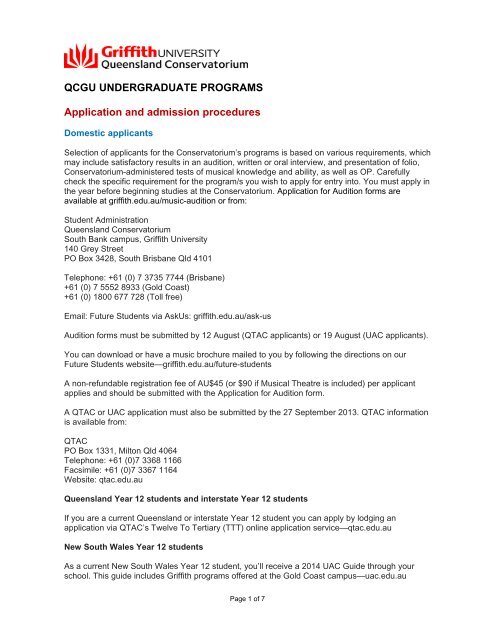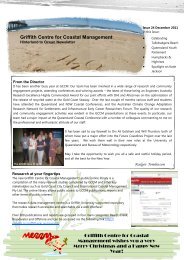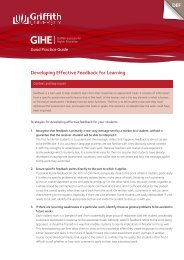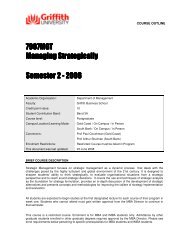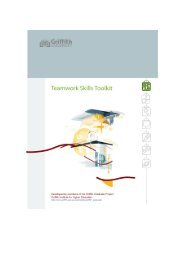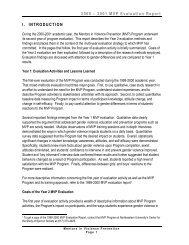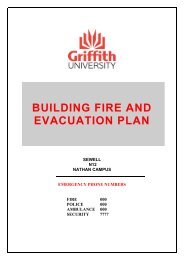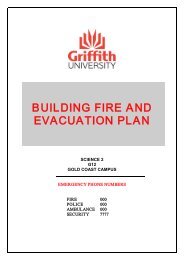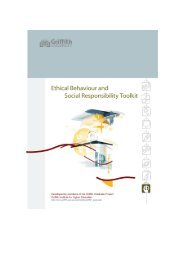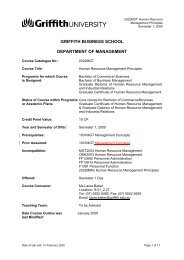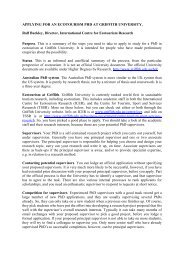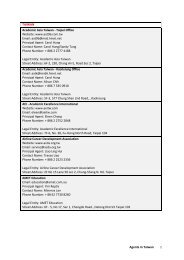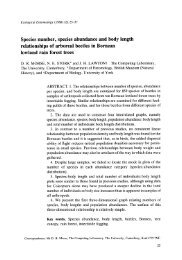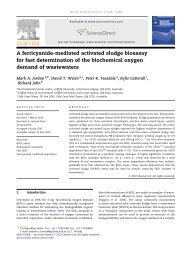Application and admission procedures - Griffith University
Application and admission procedures - Griffith University
Application and admission procedures - Griffith University
Create successful ePaper yourself
Turn your PDF publications into a flip-book with our unique Google optimized e-Paper software.
QCGU UNDERGRADUATE PROGRAMS<br />
<strong>Application</strong> <strong>and</strong> <strong>admission</strong> <strong>procedures</strong><br />
Domestic applicants<br />
Selection of applicants for the Conservatorium’s programs is based on various requirements, which<br />
may include satisfactory results in an audition, written or oral interview, <strong>and</strong> presentation of folio,<br />
Conservatorium-administered tests of musical knowledge <strong>and</strong> ability, as well as OP. Carefully<br />
check the specific requirement for the program/s you wish to apply for entry into. You must apply in<br />
the year before beginning studies at the Conservatorium. <strong>Application</strong> for Audition forms are<br />
available at griffith.edu.au/music-audition or from:<br />
Student Administration<br />
Queensl<strong>and</strong> Conservatorium<br />
South Bank campus, <strong>Griffith</strong> <strong>University</strong><br />
140 Grey Street<br />
PO Box 3428, South Brisbane Qld 4101<br />
Telephone: +61 (0) 7 3735 7744 (Brisbane)<br />
+61 (0) 7 5552 8933 (Gold Coast)<br />
+61 (0) 1800 677 728 (Toll free)<br />
Email: Future Students via AskUs: griffith.edu.au/ask-us<br />
Audition forms must be submitted by 12 August (QTAC applicants) or 19 August (UAC applicants).<br />
You can download or have a music brochure mailed to you by following the directions on our<br />
Future Students website—griffith.edu.au/future-students<br />
A non-refundable registration fee of AU$45 (or $90 if Musical Theatre is included) per applicant<br />
applies <strong>and</strong> should be submitted with the <strong>Application</strong> for Audition form.<br />
A QTAC or UAC application must also be submitted by the 27 September 2013. QTAC information<br />
is available from:<br />
QTAC<br />
PO Box 1331, Milton Qld 4064<br />
Telephone: +61 (0)7 3368 1166<br />
Facsimile: +61 (0)7 3367 1164<br />
Website: qtac.edu.au<br />
Queensl<strong>and</strong> Year 12 students <strong>and</strong> interstate Year 12 students<br />
If you are a current Queensl<strong>and</strong> or interstate Year 12 student you can apply by lodging an<br />
application via QTAC’s Twelve To Tertiary (TTT) online application service—qtac.edu.au<br />
New South Wales Year 12 students<br />
As a current New South Wales Year 12 student, you’ll receive a 2014 UAC Guide through your<br />
school. This guide includes <strong>Griffith</strong> programs offered at the Gold Coast campus—uac.edu.au<br />
Page 1 of 7
Other Australian applicants<br />
All other applicants who are Australian or New Zeal<strong>and</strong> citizens or Australian permanent residents,<br />
including c<strong>and</strong>idates for the Queensl<strong>and</strong> External Senior Examination, can apply by lodging an<br />
application using QTAC’s ‘Apply by Web’ online application service—qtac.edu.au<br />
Special Tertiary Admissions Test (STAT)<br />
Applicants 21 years of age <strong>and</strong> older who do not have any formal qualifications or whose results<br />
are insufficient for entry may nominate for the Special Tertiary Admissions Test (STAT). Details are<br />
on the QTAC website—qtac.edu.au<br />
International applicants<br />
All international students completing an Australian Year 12 study course should apply on a full-fee<br />
basis through QTAC.<br />
All other International applicants must:<br />
complete an <strong>Application</strong> for Admission as an International Student form (available from <strong>Griffith</strong><br />
International website—griffith.edu.au/international)<br />
submit certified copies of academic records (transcripts) <strong>and</strong> qualifications <strong>and</strong> any record of<br />
experience. Include course outlines of relevant courses if applying for credit<br />
submit a certified copy of English language proficiency test results (not more than two years<br />
old)<br />
pay the application fee by credit card or bank draft—payable to ‘<strong>Griffith</strong> <strong>University</strong> International<br />
Office’<br />
submit a DVD (instrumental <strong>and</strong> vocal c<strong>and</strong>idates)—see ‘Auditions’ for details<br />
or<br />
submit a folio of work (composition, or music technology applicants)<br />
or<br />
submit a folio of work on CD <strong>and</strong> an instrumental or vocal performance on DVD (popular<br />
music applicants)<br />
Note. There is no deadline for International applicants making an application with a recorded<br />
audition; however, it is advisable to apply by 31 October for Semester 1 entry the following year.<br />
All International applications should be submitted to:<br />
International Office<br />
Nathan campus, <strong>Griffith</strong> <strong>University</strong><br />
170 Kessels Road Nathan Qld 4111<br />
AUSTRALIA<br />
English language requirements<br />
English language requirements apply to International applicants <strong>and</strong> other applicants whose<br />
previous study was undertaken in a language other than English. The minimum English language<br />
requirements for such applicants for entry to these programs are as follows:<br />
A minimum overall b<strong>and</strong> score of 6.0 on IELTS (Academic) with no sub-score of less than 5.5<br />
OR a minimum score of 550 on TOEFL<br />
OR an internet-based (iBT) TOEFL score of 79 (no score less than 19)<br />
OR no score less than 3 in each skill of the ISLPR (conducted by GELI or ISLPR Language<br />
Services only)<br />
OR a minimum grade of C on the Cambridge Certificate in Advanced English (CAE)<br />
OR a minimum grade of C on the Cambridge Certificate of Proficiency in English (CPE)<br />
Page 2 of 7
OR a minimum score of 54 in the Pearson Test of English (Academic).<br />
English test results must be no more than two years old.<br />
Students who do not meet these English language requirements may enrol in <strong>Griffith</strong> English<br />
Language Institute (GELI) programs or other programs offered in Brisbane, in consultation with the<br />
Conservatorium.<br />
Notification of <strong>admission</strong><br />
The Conservatorium makes its offers through QTAC, in either the December early round or the<br />
January major round. International students are advised their result by <strong>Griffith</strong> International after<br />
the application has been assessed.<br />
Students are required to be at the Conservatorium for Orientation to be held in February 2014.<br />
Deferment<br />
You cannot defer your place at the Conservatorium. If you are unable to accept an offer, you must<br />
re-apply for entry in the usual way the following year.<br />
Auditions<br />
Domestic applicants<br />
All Queensl<strong>and</strong> Conservatorium applicants must complete an audition application. ‘<strong>Application</strong> for<br />
Audition’ forms are available from the Conservatorium website at griffith.edu.au/music-auditions<br />
The closing date for applications is 12 August. After all audition forms have been processed,<br />
c<strong>and</strong>idates will be informed of their audition date <strong>and</strong> time in writing. Bachelor of Music Technology<br />
applicants will not be required to attend a live audition but may be invited for an interview.<br />
Some areas permit applicants who are genuinely unable to travel to Brisbane (for example<br />
international applicants) to submit a good quality audition video or audio recording. The recording<br />
must be dated <strong>and</strong> certified as being an unedited performance by the applicant <strong>and</strong> signed by the<br />
person in charge of the recording session. Please contact the Conservatorium to check which<br />
areas permit recordings. It may also be possible for individual auditions to be arranged at other<br />
times during the year, for applicants travelling to Brisbane on other business. However, this cannot<br />
be guaranteed. Please contact the Conservatorium well in advance. The Conservatorium may hold<br />
auditions in Sydney <strong>and</strong> Melbourne in 2013. Details will be available via Future Students Ask Us at<br />
griffith.edu.au/ask-us<br />
The audition session for undergraduate entry in 2014 will be held from 30 September – 4 October<br />
2013 in Brisbane <strong>and</strong> the Gold Coast (Popular Music only), Queensl<strong>and</strong>.<br />
Note. Applicants must be available for audition all days during this period.<br />
International applicants<br />
International applicants may submit a good quality audition recording on DVD. It must be dated<br />
<strong>and</strong> certified as being an unedited performance by the applicant <strong>and</strong> signed by the person in<br />
charge of the recording session. It may also be possible for live auditions to be arranged during the<br />
year. Please contact the <strong>Griffith</strong> International in advance. The audition requirements vary according<br />
to the type of program you wish to apply for.<br />
Page 3 of 7
Audition requirements<br />
Bachelor of Music<br />
Classical instruments<br />
Applicants will be required to complete:<br />
1. A performance audition based on three contrasting pieces of their choice. Not all pieces will<br />
necessarily be heard <strong>and</strong> not all pieces will be heard in their entirety. Some instrumental areas<br />
may require a quick-study piece or a sight-reading example. Some instrumental areas may<br />
prescribe one or more set pieces.<br />
2. An interview in which applicants will be asked about their directions <strong>and</strong> goals, musical<br />
experience, musical knowledge, general education <strong>and</strong> other relevant matters. Applicants may<br />
present a resume of achievements <strong>and</strong> experience at the interview, if they wish. Together the<br />
playing audition <strong>and</strong> interview will last about 15–20 minutes.<br />
3. A Diagnostic Test for Music Theory <strong>and</strong> Aural Skills to be conducted either online or at the<br />
Conservatorium.<br />
Classical voice<br />
Applicants will be required to complete:<br />
1. A performance audition based on two contrasting pieces of their choice (it is important that<br />
these be within vocal capabilities but showing potential). Pieces will not necessarily be heard in<br />
their entirety.<br />
2. An interview in which applicants will be asked about their directions <strong>and</strong> goals, musical<br />
experience, musical knowledge, general education <strong>and</strong> other relevant matters. Applicants may<br />
present a resume of achievements <strong>and</strong> experience at the interview, if they wish. The playing<br />
audition <strong>and</strong> interview will together last about 15–20 minutes.<br />
3. A Diagnostic Test for Music Theory <strong>and</strong> Aural Skills to be conducted either online or at the<br />
Conservatorium.<br />
Composition (including jazz)<br />
Applicants who are focused on writing popular songs should apply for the Bachelor of Popular<br />
Music rather than the Composition specialty in the Bachelor of Music program.<br />
Applicants will be required to:<br />
1. Submit a folio comprising three or more of the applicant's compositions or equivalent evidence<br />
of musical creativity. Various media may be used <strong>and</strong> recordings included, if available. Each<br />
item should be of reasonable length, depending on the nature <strong>and</strong> context of the composition<br />
(e.g. 30 bars or more, or one or more minutes). Applicants must bring the folio with them on the<br />
day of their audition interview.<br />
2. Complete an interview in which they will be asked about their directions <strong>and</strong> goals, musical<br />
experience, musical knowledge, general education <strong>and</strong> other relevant matters. Applicants may<br />
present a resume of achievements <strong>and</strong> experience at the interview.<br />
3. A Diagnostic Test for Music Theory <strong>and</strong> Aural Skills to be conducted either online or at the<br />
Conservatorium.<br />
Page 4 of 7
Jazz instruments<br />
Applicants will be required to complete:<br />
1. A performance audition based on three contrasting pieces. At least one of these should<br />
demonstrate an ability to improvise over a common jazz form such as blues or a 32-bar<br />
st<strong>and</strong>ard tune. Not all pieces will necessarily be heard in their entirety. Use of pre-recorded or<br />
live accompaniment is acceptable. Audition repertoire can be contrasting in terms of tempo <strong>and</strong><br />
mood; style (swing, bossa nova, samba, ballad, funky); form (blues, 32-bars, other lengths);<br />
<strong>and</strong> tonality (major, minor, blues).<br />
Suggested Jazz repertoire:<br />
Blues: Now's the Time, C-Jam Blues, Centrepiece, Sonny, Moon for Two.<br />
Bossa nova: Black Orpheus, Blue Bossa, Gentle Rain, Recordame, Perdido, any<br />
composition by Antonio Carlos Jobim.<br />
St<strong>and</strong>ards: Autumn Leaves, Summertime, Beautiful Love, God Bless the Child, Stormy<br />
Weather, Misty, Take the ‘A’ Train, any st<strong>and</strong>ard by Porter, Gershwin, Berlin, Schwartz,<br />
Rodgers, Ellington, Arlen, Kern, etcetera.<br />
Jazz drummers may include a snare drum study as one of the pieces.<br />
Saxophonists may include an etude (for example, Lennie Niehaus, Jim Snidero) as one of<br />
the pieces.<br />
Pianists may include a transcription (for example, Dave Brubeck, Bill Evans) as one of the<br />
pieces.<br />
Students may be asked to sight-read.<br />
2. An interview in which applicants will be asked about their directions <strong>and</strong> goals, musical<br />
experience, musical knowledge, general education <strong>and</strong> other relevant matters. Applicants may<br />
present a resume of achievements <strong>and</strong> experience at the interview, if they wish. The playing<br />
audition <strong>and</strong> interview will together last about 15–20 minutes.<br />
3. A Diagnostic Test for Music Theory <strong>and</strong> Aural Skills to be conducted either online or at the<br />
Conservatorium.<br />
Jazz voice<br />
Applicants will be required to complete:<br />
1. A performance audition based on three contrasting pieces. C<strong>and</strong>idates need to show through<br />
their repertoire selection an interest in improvising in a jazz style <strong>and</strong> may be asked to solo<br />
over a blues form. Audition repertoire can be contrasting in terms of tempo <strong>and</strong> mood; style<br />
(swing, bossa nova, samba, ballad, funky, popular, music theatre); form (blues, 32-bars, other<br />
lengths); <strong>and</strong> tonality (major, minor, blues). At least two of the repertoire selections should be a<br />
blues or jazz st<strong>and</strong>ard in the style of such artists as Ella Fitzgerald, Sarah Vaughan, Diana<br />
Krall, Frank Sinatra, Tony Bennett or Kurt Elling. A jazz st<strong>and</strong>ard is virtually any song by<br />
Gershwin, Porter, Berlin, Rodgers, Arlen, Schwartz <strong>and</strong> Ellington. Use of pre-recorded or live<br />
accompaniment is acceptable.<br />
2. An interview in which applicants will be asked about their directions <strong>and</strong> goals, musical<br />
experience, musical knowledge, general education <strong>and</strong> other relevant matters. Applicants may<br />
present a resume of achievements <strong>and</strong> experience at the interview, if they wish. The playing<br />
audition <strong>and</strong> interview will together last about 15–20 minutes.<br />
3. A Diagnostic Test for Music Theory <strong>and</strong> Aural Skills to be conducted either online or at the<br />
Conservatorium.<br />
Page 5 of 7
Musical theatre<br />
Applicants will be required to complete a possible two phases:<br />
Phase 1<br />
Dance: Following a warm-up <strong>and</strong> basic technical exercises applicants will be taught a short routine<br />
which they will present to the panel.<br />
Singing: Applicants will present one song to the panel (due to time limitations, a vocal warm-up will<br />
not be provided as part of the audition. Applicants should come prepared). However, you should<br />
prepare two singing pieces from the Musical Theatre repertoire. These should last no longer than 2<br />
minutes each—not be from the classical repertoire (this includes Opera); not be accompanied by a<br />
backing track; be performed in the key in which they’re written (the pianist will not transpose at<br />
sight, into a different key); give you the opportunity to act through the content of the words as well<br />
as to sing the tune.<br />
Depending on your Phase 1 audition, you may be asked to return for Phase 2.<br />
Phase 2<br />
Acting: Applicants will present two acting pieces to the panel. These pieces should: last no longer<br />
than 2 minutes each; only be from published plays; not be extracts from poems or novels; <strong>and</strong> one<br />
piece must be modern—after 1945.<br />
Voice: Applicants spoken voice will be considered during the performance of their acting pieces.<br />
Singing: Applicants will present their second song to the panel.<br />
Bachelor of Music Technology<br />
Applicants for <strong>admission</strong> to the academic program will not have an audition but may be asked to<br />
attend an interview. They will also be required to provide:<br />
a portfolio of original works consisting of one (single) 15–45 minute CD or CD-R of music<br />
recorded/created by the applicant, together with a technical description of each work on the<br />
CD. This description should include a brief overview of the technical set-up, a brief discussion<br />
of any problems encountered, the solutions to these problems, <strong>and</strong> an evaluation of the overall<br />
results—aesthetic considerations are important. (The written component should be<br />
approximately 1–2 pages for each work included on the CD. Multiple works can be discussed<br />
jointly as a single “project”, however more than one “project” is desirable.)<br />
a written resumé of achievements <strong>and</strong> experience<br />
a written statement of the applicant's career aims <strong>and</strong> goals (one page).<br />
The recordings should be clearly identified <strong>and</strong> attached securely within the overall folio<br />
submission. The resumé of achievements <strong>and</strong> experience should:<br />
be submitted in a format no larger than A4<br />
clearly identify all of the applicant's significant details including name, address, telephone<br />
number <strong>and</strong> email address<br />
provide a detailed outline of relevant music <strong>and</strong> technology experience, knowledge <strong>and</strong><br />
opportunities, career goals, general education, <strong>and</strong> other supporting information<br />
present a complete listing of audio titles presented in the recording folio, together with<br />
composition, recording credits <strong>and</strong> supporting information as necessary to fully describe the<br />
work.<br />
Page 6 of 7
Applicants must submit the recording folio <strong>and</strong> resumé to Student Administration at the<br />
Conservatorium by Friday, 27 September 2013. Interviews, if required, will be held during the week<br />
of 30September – 4 October 2013. Folios are not returned.<br />
Applicants should be ranked on academic st<strong>and</strong>ing (OP), have a ‘Sound Achievement’ in Year 12<br />
English <strong>and</strong> a ‘Sound Achievement’ in either Maths A, B or C. Applicants over the age of 21 can sit<br />
the Special Tertiary Admittance Test (STAT) through QTAC.<br />
Bachelor of Popular Music<br />
Applicants for <strong>admission</strong> to this academic program will be required to:<br />
1. Complete an interview in which they will be asked about their musical directions <strong>and</strong> goals,<br />
musical experience <strong>and</strong> knowledge, familiarity with audio hardware <strong>and</strong>/or software, general<br />
education, <strong>and</strong> other relevant matters. Applicants should provide a resume of achievements<br />
<strong>and</strong> experience at the interview.<br />
2. Present a recording folio on CD as well as a live instrumental or vocal performance. The CD<br />
should be accompanied by documentation describing the applicant's contribution, for example,<br />
writing, recording, performance.<br />
The recorded folio <strong>and</strong> live performance can include covers but original compositions are<br />
preferred. For the live performance, applicants should prepare three contrasting pieces <strong>and</strong> include<br />
original material. Collaborative compositions are acceptable. Pieces will not necessarily be heard<br />
in their entirety. Applicants should bring the folio with them on the day of their audition interview.<br />
Components one <strong>and</strong> two will last about 20 minutes.<br />
Certificate in Music Studies<br />
Applicants for <strong>admission</strong> to this academic program will complete the same audition, interview <strong>and</strong><br />
test requirements as for the Bachelor of Music.<br />
Bachelor of Music/Bachelor of Business<br />
Admission to this academic program will be based on an audition <strong>and</strong> interview in addition to your<br />
academic results. Visit griffith.edu.au/music/queensl<strong>and</strong>-conservatorium to find out more.<br />
In addition to the audition, you will still need to lodge a QTAC application by 27 September 2013.<br />
Revised: 8 May 2013<br />
Page 7 of 7


